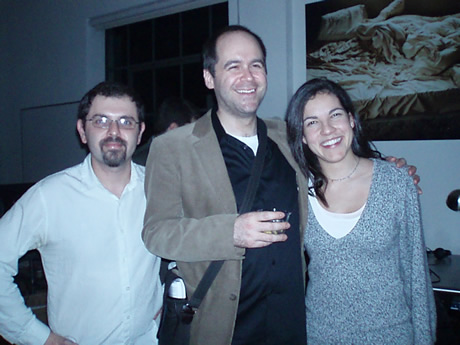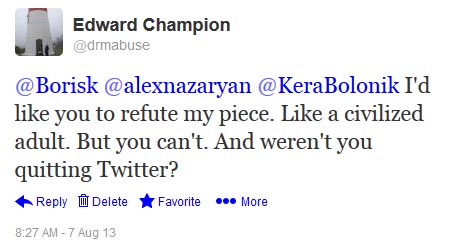(This is the seventh entry in The Modern Library Nonfiction Challenge, an ambitious project to read and write about the Modern Library Nonfiction books from #100 to #1. There is also The Modern Library Reading Challenge, a fiction-based counterpart to this list. Previous entry: The Promise of American Life.)
History is never the thrilling Zapcat powerboat ride it can and should be when we remain committed to oaring through the same exhausted legends about American exceptionalism and bogus democratic promise. Much as we may find new insights into human existence by tilting our canoes to the ripples contained within a storyteller’s cadences, so too may we discover more complete ways of contending with our historical contradictions through the viewpoint of a responsible revisionist armed with the facts and rejecting the hard establishment line.
The revisionist historian, that charming and sometimes infuriating rabble-rouser never to be confused with some creepy Holocaust denier flailing in a sea of empty Cheetos bags and crackpot pamphlets, often gets needlessly maligned in America. Before Annette Gordon-Reed offered conclusive evidence of Thomas Jefferson’s relationship with Sally Hemings (upheld by a 1998 DNA test), Fawn Brodie was attacked by vanilla-minded legacy holders two decades before for pushing beyond James Callender’s tawdry trolling, daring to suggest that there was good reason to believe that our much heralded champion of the rights of man had skeletons in his closet that were vital to understanding his philosophy. Brodie’s book, despite its psychobiographical failings, led to a reckoning with our myths and assumptions about the Sage of Monticello, one that continues to this very day with college students demanding the removal of Jefferson statues on campuses.
Provided that their efforts do not involve going out of their way to Bowlderize troubling if incontrovertible parts of the story and the results are as expansive and as rigorous as their more timorous mainstream counterparts, revisionists are often vital reconcilers of the public record. It is the facile propagandist who ignores Rosa Parks’s radicalism to paint a roseate image of a meek and tired seamstress who refused to give up her seat on a bus (“small,” “delicate,” and “little,” as belittled by Bill Clinton in 2005) or who upholds the lie that Abner Doubleday created baseball.
In recent decades, many young students have ardently clutched their copies of Howard Zinn’s A People’s History of the United States with the taut adamantine grip of a Fallout 4 junkie reluctant to capitulate her controller. Zinn’s thoughtful volume has been vehemently denounced by some establishment historians who have questioned the perceived polemical emphasis of class conflict at the expense of other issues. But before Zinn, there was William Appleman Williams, a brash energetic troublemaker who was arguably a more rigorous scholar than Zinn and who was among the best and the boldest of the firebrand 20th century historians who emerged from a Charles Beard afterglow with ass to kick once the bubble gum supply ran out.
William Appleman Williams unpacked the economic motivations of American expansion and foreign policy in The Tragedy of American Diplomacy and broadened this scholarship further with The Contours of American History, a punchy volume examining how imperialism and liberalism became a sordid double stitch intertwined in the American quilt well before the Sons of Liberty spilled massive chests of desperately offloaded tea into Boston Habor. Yet Williams’s often nimble analysis, riddled as it sometimes is with conceptual overreach, robustly articulates the ever-changing and contradictory American Weltanschauung that has motivated nearly every governmental decision since. He documents a worldview that started off with the relatively benign goal of creating and sustaining an economic nation that provided for everyone, but devolved under the autocratic yoke of Jacksonian democracy and Gilded Age greed to the corporate capitalist nightmare we are all trying to awake from today. And because Williams’s challenge to the so-called “American experiment” was so unprecedented in the mid-20th century, this historian was tarnished, besmirched, and condemned by other putative progressives who might have enlarged their rigid notions of national identity if they had been more willing to dive into the subtle words and actions directing the unshakable financial impetus.
Williams was harassed by the House Committee on Un-American Activities, that despicably despotic body that ruined the lives of so many, with a demand to produce the unfinished Contours manuscript. The HUAC would order Williams to testify in Washington and then cancel the appearance by telegram once he’d hopped on a train to the Beltway. Even after he testified for ten minutes and the HUAC abandoned its witch hunt, the IRS harassed him in various forms for nearly twenty years. Williams was hounded by the neoliberalism critic Arthur Schlesigner, Jr., who dutifully condemned Williams as “pro-communist” to the American Historical Association’s president. Even as late as 2009, an academic called Williams an “idiot” before a Society of Historians of American Foreign Relations panel, decrying Williams’s approach to history as a crude retooling of Charles Beard’s infamous assault upon our Founding Fathers’s pecuniary predispositions.1
But Williams was far from a typical progressive. He was a registered Republican when he first came to Wisconsin. He voted for Nixon as the lesser evil in 1960. And even in Contours, he defended Herbert Hoover’s hands-off Depression era policies, seeing this as a necessary tactic to forestall property holders from creating a business-friendly fascism that could have had a more diabolical effect on our clime than the many Hoovervilles that had mushroomed across the nation. Williams argued that Hoover’s perceived failure to do anything represented a more active resistance against special interests than the Progressive Movement was willing to acknowledge or act upon at the time. And that’s the way this jazz-loving Midwestern historian rolled. As Williams was to write in a 1973 essay, the revisionist’s duty was to “see basic facts in a different way and as interconnected in new relationships. He is a sister and a brother to those who use old steel to make a zipper, as contrasted with those who add new elements to make a better steel.”
In my previous Modern Library essay, I castigated Herbert Croly for the historical developments that he could not see ahead of him, for erring too much in his perfervid belief in a central government and for diminishing the justifiable grievances of protesters. William Appleman Williams may very well represent the opposite problem: a historian who could see the implications of any action all too well, one who was willing to articulate any interpretation of the facts even if it meant being alienated by the jingoistic minds who needed to reconsider the other fateful historical trajectories upholding the status quo.
Williams’s highly specific examples very much allow him to sell us on his interpretation. In Tragedy, for example, Williams’s deductive prowess is in high gear when he examines how Woodrow Wilson’s March 1913 decision to refuse a government loan to China, one long coveted by American industrialists at the time (and later attempted privately), actually fell within the framework of the Open Door Policy. Many historians have interpreted Wilson’s pushback as a betrayal of American expansionism at the time, but Williams points to the lack of private capital available to fulfill the job as well as the possibility that any governmental loan, even one secured with the help of other financiers, may have been perceived as a very clear threat to neighboring Japan. The Open Door Policy, for all of its flaws and its needless sullying of China, was intended to provide a peacefully imperialist framework for a burgeoning American empire: a GATT or IMF before its time, though regrettably without much in the way of homegrown protest. (Rebellion would come later in Beijing with the May Fourth movement.) The ostensible goal was to strengthen China with fresh influxes of low-risk private capital so that it could withstand troublesome neighbors looking for a fight, even as the new obligations to American entrepreneurs forged hot rivulets of cash rolling back to the imperialist homeland. Wilson’s decision was, as discerned by Williams, a canny chesslike stratagem to avoid war and conflict, one that would keep China a servant to America’s riches. From the vantage point of the 21st century, this useful historical interpretation reveals Wilson to be a pioneer in the kind of venal and now all too commonplace globalization that morally bankrupt neoliberals like Thomas Friedman have no problem opening their old steel zippers for. Their free trade fantasies possess all the out-of-sight, out-of-mind justification of a revenge porn junkie ignoring another person’s real world humiliation for fleeting sociopathic pleasure.
It was with Contours that Williams blew the lid off the great American lie, exposing the American liberal’s failure to confront his own implication in much of the lasseiz nous faire madness. Williams traced the origins of our mercantilist approach to Anthony Ashley Cooper, the Earl of Shaftesbury. In the 17th century, Shaftesbury was a political figure who opposed harsh penalties and absolutist government. He stood up for the nonconformists and called for regular parliaments, and would go on to found and lead the early Whig party in the wake of the British Exclusion Crisis. While traveling to Oxford to remove an abscess from his liver, he hit it off with a young doctor by the name of John Locke. (There weren’t as many cafes back then as there are today. In the 1600s, you had to take whatever mingling opportunities you could get.) Locke, of course, would later have many ideas about the social contract, a scheme about inalienable natural rights that would eventually find its way into a number one ditty penned by Jefferson that would become known as the Declaration of Independence.
But there was a twist to this tale. As Williams points out, Locke’s ideas were a corruption of Shaftesbury’s more inclusive and democratic efforts. Where Shaftesbury was willing to rebel against the King to ensure that courts and alternative political parties were in place to prevent the government from becoming an absolute tyranny, even going to the trouble of building a coalition that extended across all classes to fight for these safeguards when not putting together the Habeas Corpus Act of 1679, it was Locke who limited Shaftesbury’s remarkably liberal contributions by undercutting individual rights. Locke believed that those who owned property were perfectly justified in protesting their government, for they were the ones who had entered into a social contract. But the rabble who didn’t own property could more or less buzz off.2 As Williams put it, “[I]ndividualism was a right and a liberty reserved to those who accepted a status quo defined by a certain set of natural truths agreed upon a majority. Within such a framework, and it is a far narrower set of limits than it appears at first glance, the natural laws of property and labor were deemed sufficient to guide men’s pursuit of happiness.”
Yet those who subscribed to these early mercantilist standards believed that this classically liberal idea of “corporate structure” involved a basic responsibility to provide for everyone. And the way of sustaining such a benevolent national juggernaut was through the establishment of an empire: a Pax Americana predicated upon the promise of a democracy promulgated by patriarchs who not so quietly believed that the people were incapable of it.3 Williams observes how the Quakers in Philadelphia, who opposed expansion and much of the onslaughts against Native Americans, were very much committed to noblesse oblige, setting up hospitals, education, and philanthropic endeavors to take care of everyone. But this generous spirit was no match for the free trade nabobs or the hard-hearted Calvinists who increasingly shifted such solicitude to the propertied class (one can easily imagine Alec Baldwin’s Glengarry Glenn Ross “Always be closing” speech spouted by a Calvinist), leading the great theologian Jonathan Edwards to offer righteous pushback against “fraud and trickishness in trade.”
Against this backdrop, post-Revolutionary expansion and the Monroe Doctrine allowed mercantilism to transmute into an idea that was more about the grab than the munificent results, with visions of empire dancing in many heads. By the time Frederick Jackson Turner tendered his Frontier Thesis in 1893, mercantilism was no longer about providing for the commonweal, but about any “self-made man” looking out after his interests. Williams points to Chief Justice John Marshall’s efforts to enforce safeguards, such as his Gibbons vs. Ogden decision regulating interstate commerce, against the monopolies that would come to dominate America near the turn of the century. Marshall’s immediate successor, Chief Justice Taney, expanded the flexibility of the Constitution’s Contract Clause with his 1837 Charles River Bridge v. Warren Bridge decision, permitting states to alter any contract as it saw fit. While Taney’s decision seemed to strike the death knell against monopolies, it was no match against the consolidated trusts that were to come with the railroads and the robber barons. Rather curiously, for all of his sharp observations about free trade and expansionist dangers during this time, Williams devotes little more than a paragraph to the 1836 closing of the Second Bank of the United States:
[Nicholas Biddle] did a better job than the directors of the Bank of England. Under his leadership the bank not only established a national system of credit balancing which assisted the west as much as the east, and probably more, but sought with considerable success to save smaller banks from their own inexperience and greed. It was ultimately his undoing, for what the militant advocates of lasseiz nous faire came to demand was help without responsibilities. In their minds, at any rate, that was the working definition of democratic freedom.
Talk about sweeping one of the greatest financial calamities in American history under the rug! I don’t want to get too much into Andrew Jackson, who I believe to be nothing less than an abhorrent, reckless, and self-destructive maniac who claimed “liberalism” using the iron fist of tyranny, in this installment. I shall preserve my apparently unquenchable ire for Old Hickory when I tackle Arthur Schlesinger, Jr.’s The Age of Jackson in a few years (Modern Library Nonfiction #36). But Jackson’s imperious and irresponsible battle with Biddle, complete with his Specie Circular, undoubtedly led to the Panic of 1837, in which interest rates spiked, the rich got richer, a fixable financial mess spiraled out of control and became needlessly dangerous, and buyers could not come up with the hard cash to invest in land. Considering Williams’s defense of Hoover in both Contours and Tragedy, it is extremely curious that he would shy away from analyzing why some form of central bank might be necessary to mitigate against volatility, even though he adopted some fascinating counterpoints to the “too big to fail” theory decades before Bernanke and Krugman.
This oversight points to the biggest issue I have with Williams. His solution to the great imperialist predicament was democratic socialism, which he called “the only real frontier available to Americans in the second half of the 20th century.” While this is a clever way of inverting Turner’s thesis, to uphold this, Williams cites a few examples such as the courage of Wendell Phillips, a few throwaway references to social property, and a late 19th century return with Edward Bellamy and Henry Demarest Lloyd to the Quaker-like notion of “a commonwealth in which men were brothers first and economic men second.” But while Williams is often a master of synthesis, he falls somewhat short in delineating how his many historical examples can aid us to correct our ongoing ills. If the American Weltanschauung is so steeped in our culture, how then can democratic socialism uproot it? This vital question remains at the root of any progressive-minded conversation. But now that we have a presidential race in which socialism is no longer a dirty word and the two leading Democratic candidates bicker over who is the greater progressive, perhaps the answer might arrive as naturally as Williams anticipated.
Next Up: Richard Hofstadter’s The American Political Tradition!





